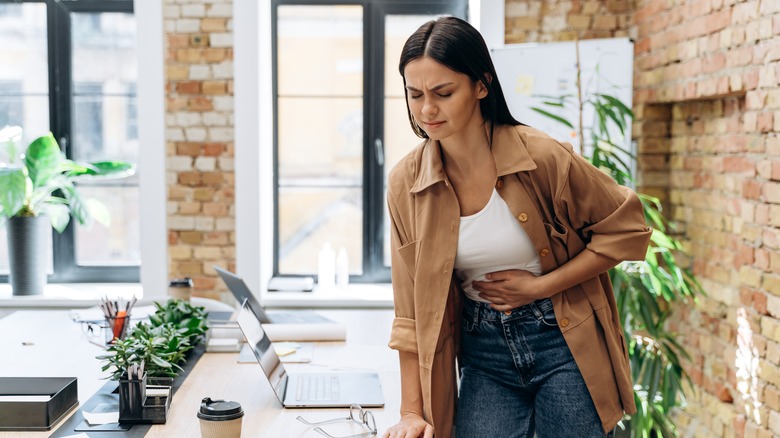How To Prevent A Crohn's Disease Flare-Up
Crohn's disease is characterized by a progressive and chronic inflammation of the digestive tract, says Medical News Today. As an inflammatory disease, Crohn's disease can cause various symptoms, including abdominal pain, bloody stools, diarrhea, and fatigue. If you have the condition, your illness will accompany you throughout your life, and learning how to manage the symptoms will be key to maintaining your health and well-being.
Although the condition is not yet curable, it can be managed well. A treatment that is optimally tailored to you can help you to lead an active life and prevent new flare-ups. Treatment aims to improve your quality of life, alleviate your symptoms, and reduce inflammation, says the Mayo Clinic. A nutritious diet that avoids potential food triggers, healthy lifestyle choices, and medication will all be important parts of a treatment plan to put your disease into a resting phase (remission) that lasts as long as possible.
Tips to prevent a flare-up
To help prevent flare-ups, taking your medication as your doctor prescribes is first important. Several types of medications can help keep inflammation under control, including anti-inflammatory drugs, immunosuppressants, and biologics, as explained by the Mayo Clinic. Your doctor might also recommend dietary changes and place you on a Crohn's disease diet. Certain foods may trigger symptoms in some people with Crohn's disease, so it's important to identify and avoid them. Common triggers include dairy products, high-fat foods, spicy foods, and fiber-rich foods, per the Cleveland Clinic. Keeping a food diary can help identify triggers and avoid them in the future.
According to WebMD, stress is also a known trigger for Crohn's disease flare-ups, so finding ways to manage stress levels is important. Stress-relieving activities such as yoga, meditation, or deep breathing exercises can help. Maintaining a healthy lifestyle is also vital. Regular exercise, for example, may help improve your immune function to help reduce inflammation.
The risks of unmanaged Crohn's disease
Your active cooperation is always necessary for successful treatment. Untreated Crohn's disease can lead to serious complications. Inflammation of the bowel can cause narrowing or blockages in the intestines, which can require surgery to correct, according to the Mayo Clinic. In addition, chronic inflammation can lead to the formation of ulcers, fissures, and fistulas in the intestines, which can be painful and can increase the risk of infection, explains Medical News Today.
Always try to stay on top of regular check-ups with your doctor. Regular monitoring can help detect any changes in your condition and prevent flare-ups from occurring. Please explain your needs, expectations, and fears to your doctor if you have any concerns. Let them know if your current treatment does not bring the desired result. Together you can find out which alternatives are available for you. An IBD specialist, i.e., a gastroenterologist who specializes in chronic inflammatory bowel diseases, can also help craft a treatment plan specifically for you.



